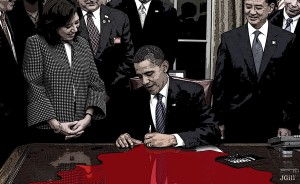What do we owe to those who fight and give, as President Lincoln spoke at Gettysburg, “their last full measure of devotion”?
More, surely, than appreciative applause for the troops on airplanes and at professional sporting events … with their high-priced, taxpayer-paid military promotions.
First, vets are entitled to contracted-for medical care, as I addressed in greater detail at Townhall.com yesterday — not a Veterans Administration that systematically denies them needed diagnoses and treatments.
Second, wiser strategic decisions going forward. Vets deserve, and we all need, more (not fewer) questions of presidential candidates, such as the hypothetical inquiry of former Florida Gov. Jeb Bush on Iraq, and the hypothetical Libya question Sen. Rand Paul suggests should be posed to Mrs. Clinton.
Bring on the if-you-knew-then questions!
But wait, what about a non-hypothetical: Are we today at war against the Islamic State?
We really should know … I mean, on Memorial Day and all.
President Barack Obama claims he has the constitutional power to engage militarily against the Islamic State under Congress’s 2001 Authorization for Use of Military Force (AUMF). A number of legal scholars vehemently disagree. Which may be why, back in February, Obama asked for a new, anti-ISIS AUMF. Congressional Republicans balked, complaining the president’s proposed AUMF isn’t strong enough.
Of course, nothing prevents congressional Republicans from passing a stronger version.
Or better yet, demand that President Obama keep American boys and girls out of harm’s way in the always-messy Middle East.
The murderous leaders of the Islamic State may wish to be at war with us, but we don’t have to humor them. Let Turkey, Saudi Arabia, Jordan, Iraq and Iran defend themselves and their territories from this gang of cutthroats.
This is Common Sense. I’m Paul Jacob.


 The new Iraq War has been pitched
The new Iraq War has been pitched 

